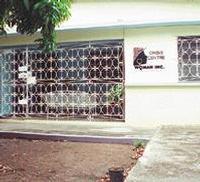By Naomi Francis, Staff Reporter 
The crisis centre was relocated in September 2000. It is now located in a quiet suburban area at 7 Denehurst Avenue (corner of Cheltenham Drive, off Margaret Villa Road, off Hagley Park Road). Staff members say the new facilities allow for greater privacy for clients. - Carlington Wilmot
OFTEN THE police force is painted as brutal and heartless, but many are being trained to dispel that perception. Since last year more than 33 officers have been trained in how to intervene in domestic violence cases.
"The police and social workers are two of the most critical front-line groups, they need to intervene properly in domestic violence. The idea though is to train all front-line police officers," says Director of the police staff college Superintendent Novelette Grant.
Funded by the United Nations Development Programme (UNDP) and the Caribbean Association For Feminist Research and Action (CAFRA) the programme was launched a year ago. Woman Incorporated, a local domestic violence support group, helps to co-ordinate the project.
Essentially, the programme helps the police to understand the psychology of domestic violence and to assist members of the force to respond in an appropriate way.
NOT SIMPLY A DOMESTIC ISSUE
"Given the severity of domestic violence in Jamaica we extend the training to
churches, schools, guidance counsellors and people from the victim support programme," says Superintendent Grant.
"We are trying to empower a wide community base to intervene and help in domestic violence, once there is a homicide they (the neighbours) will say 'mi did know sey dem dida live bad'. They (the residents) will know of incidents before the police do, so if we can empower them then we broaden the base of those who can help," she adds.
Through a series of participatory role plays and other excercises which include gender awareness and women's experience of abuse, officers and the wider community are taught how to help victims in need.
"There has evolved a culture of people saying 'it's a domestic issue and I'm not touching it'. Our members are recognising that it's not as simple as it looks and to build a sense of empathy," Superintendent Grant continues.
Woman Inc. is leading a number of civil groups applauding the efforts of the programme and by extension the police.
"It is our vision that through this process of engendering greater sensitivity and a thorough understanding of how women experience the abuse and violence, that societal expectations, values and attitudes (to domestic violence) will shift," says Joyce Hewett, executive member of Woman Inc.
A critical part of the training is the lectures on the Domestic Violence Act. "We help them to understand how to treat with a victim, getting a report, building sympathy and to do what the law provides for them to do. We have to work with the Domestic Violence Act and other related acts such as the Offences Against the Person Act, we are developing a zero tolerance approach for that kind of behaviour," says Superintendent Grant.
"There has been a shift, at the start there is normally scepticism to say this is a feminist thing but people usually leave with a greater appreciation of domestic violence and are better able to cope with it, the move from indifference to empathy," she says.
Under the Domestic Violence Act
spouses, parents, children or dependents can get special protection. It also recognises common law relationships. So the court can, for example, issue a restraining order against an abusive husband.
Here are some steps recommended for abused women. The information is also published by the Crisis Centre.
Report all forms of abuse to the police.
Go to the office of the Resident Magistrate or Family Court nearest you to ask for assistance.
Seek some form of legal assistance.
Trust a friend or family members who will assist you to take positive action
Call the crisis centre, professional counsellors are there who can assist. It's located in Kingston at 7 Denehurst Avenue (corner Cheltenham Drive) off Margaret Villa Road off Hagley Park Road, and in Montego Bay at 4 Sam Sharpe Square. There is a 24 hour hotline in Kingston 929-2997/926-9398 or toll free,
1-888-7477.
The centre provides counselling on matters concerning rape, incest, and sexual harassment at the workplace, domestic crisis and domestic violence. It also offers
temporary housing to victims.
Reflections on domestic violenceBy Sandra Ledgister, Contributor
You know, when you look
at a man with your heart
instead of your eyes
It's so easy to feel
And never listen to the lies.
And when he's hurt you so bad
You can't afford to see yourself cry
So you hide from the mirrors
And convince your soul
it's telling a lie.
'Cause you can't let yourself realise it's true
And he's broken your heart,
your soul, your you.
You know when you're curled
up in bed
And he's beside you
But he's a thousand miles away
And you're black and blue
And you're watching a movie
Inside of your head
Where the woman is the victim
'Cause she's lying there dead.
And her man is the killer
Standing over you
His trophy is our heart, your soul, your broken ribs too.
You know, when you realise
the dark you
Live in, isn't a continuous night?
Your honour, I did what I did
To get into the light.
You call it murder. I call it
my right.

